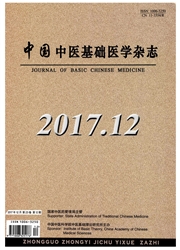

 中文摘要:
中文摘要:
目的:观察丹枝饮对盆腔炎性疾病后遗症-慢性盆腔痛的临床疗效,观察其对慢性盆腔痛疼痛缓解率、慢性盆腔痛视觉模拟评分(VAS评分)、临床中医证候评分、抑郁状态评分、焦虑状态评分的影响。方法:采用随机对照单盲法将符合标准的60名患者分为丹枝饮组和对照组,丹枝饮组采用自拟方丹枝饮治疗,对照组采用膈下逐瘀汤治疗,连续治疗21 d,观察2组治疗前后慢性盆腔痛疼痛缓解率、慢性盆腔痛视觉模拟评分(VAS评分)、临床中医证候评分、抑郁状态评分、焦虑状态评分的变化情况。结果:丹枝饮组治疗后总有效率83.4%,其中痊愈6.7%,有效56.7%,显效20%;丹枝饮可以减轻患者的慢性盆腔痛VAS评分,可以改善中医证候学评分、抑郁状态评分和焦虑状态评分。结论:丹枝饮可以改善气滞血瘀型盆腔炎性疾病后遗症-慢性盆腔痛的疼痛程度,改善患者焦虑抑郁状态,是临床治疗气滞血瘀型盆腔炎性疾病后遗症-慢性盆腔痛的一种安全有效的方法。
 英文摘要:
英文摘要:
Objective: To investigate the clinical effect of Danzhi Decoction (DZD) on chronic pelvic pain of Qi stagnation and blood stasis with sequelae of pelvic inflammatory disease. To observe the chronic pelvic pain relief rate, the visual analogue scale for chronic pelvic pain, the score of traditional Chinese medicine syndromes, the self-rating depression scale and the self-rating anxiety scale before and after treatment. Methods:Sixty patients with chronic pelvic pain of Qi stagnation and blood stasis with sequelae of pelvic inflammatory disease were randomly divided into DZD group and control group. The DZD group included 30 patients, who treated with Danzhi Decoction for 21 days. The control group included 30 patients treated with Gexiazuyu Decoction for 21 days. Results:After the treatment of DZD, the total effective rate was 83.4% and the cure rate was 6. 7% , and the effective rate was 56.7% and the effective rate was 20%. DZD can reduce the patients with chronic pelvic pain VAS score and improve the traditional Chinese medicine syndromes, the self- rating depression scale and the self-rating anxiety scale. Conclusion: Danzhi Decoction is a safe and effective method for treating chronic pelvic pain of Qi stagnation and blood stasis with sequelae of pelvic inflammatory disease.
 同期刊论文项目
同期刊论文项目
 同项目期刊论文
同项目期刊论文
 期刊信息
期刊信息
